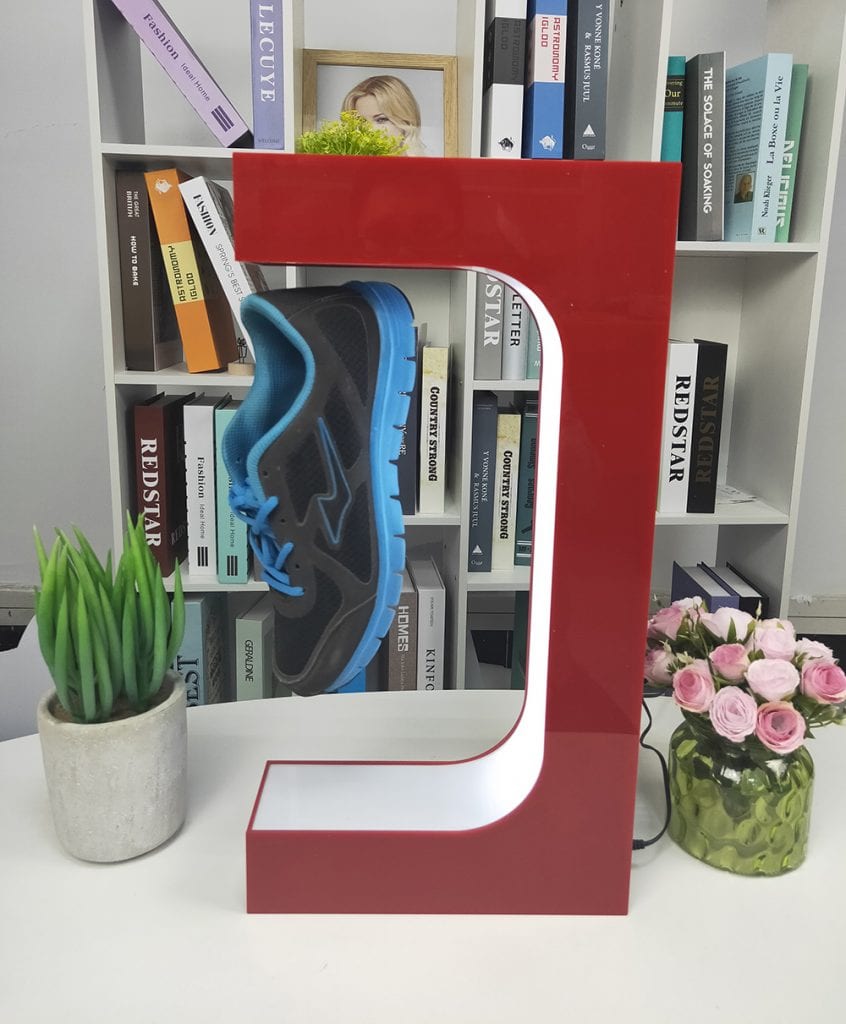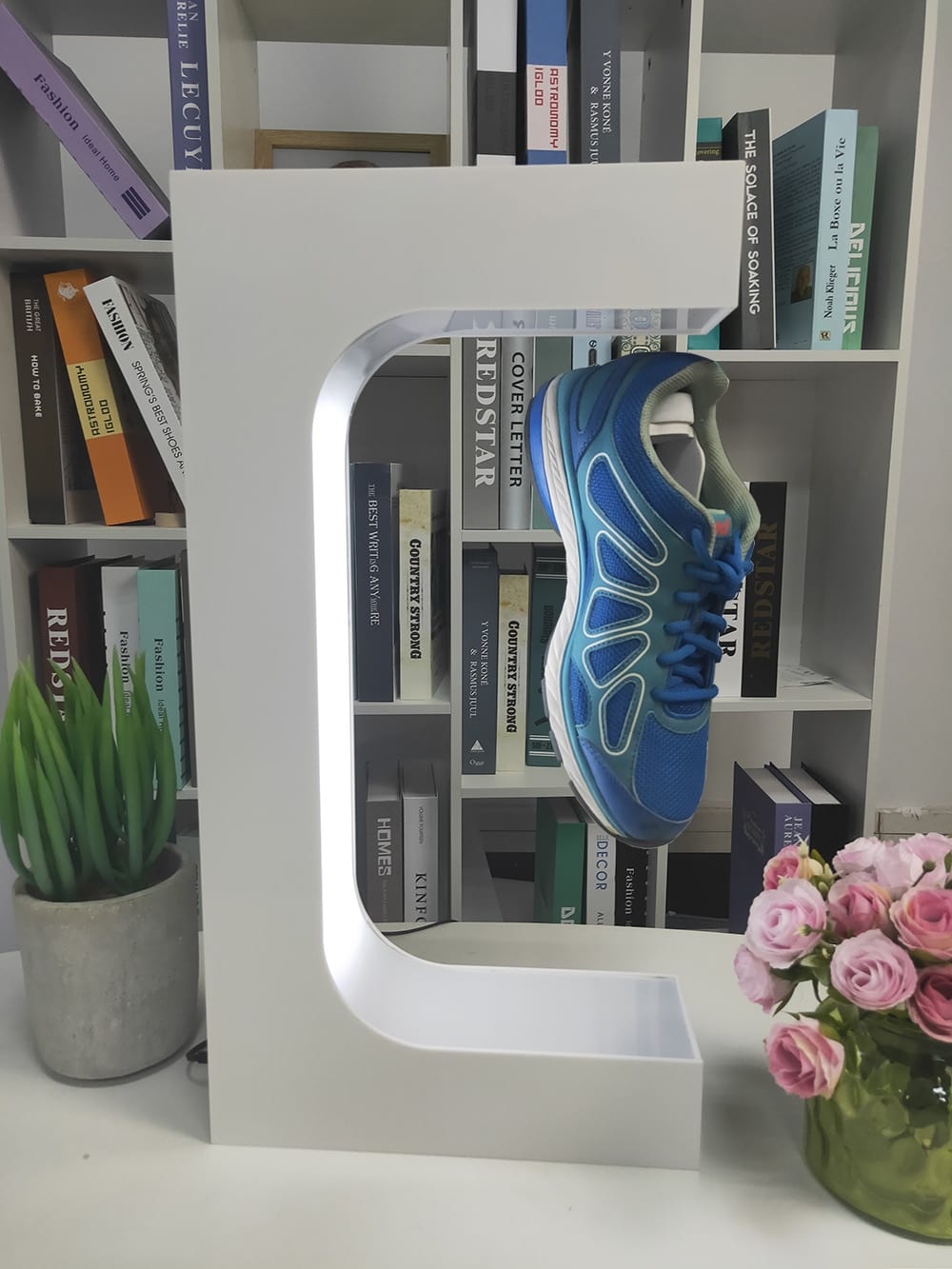In today's competitive retail landscape, floating shoe display has become a game-changer for businesses looking to enhance their visual merchandising strategies. Retailers are constantly searching for innovative ways to capture customer attention and increase sales. The floating shoe display concept offers a unique and stylish approach to presenting footwear that can significantly boost your store's appeal.
This modern display method allows shoes to appear as if they're floating in mid-air, creating an eye-catching and sophisticated presentation. This technique not only enhances the visual appeal of your store but also helps in drawing customers' attention to specific products, ultimately leading to increased sales.
Whether you're a seasoned retailer or just starting out, understanding how to implement floating shoe displays effectively can make a substantial difference in your business. In this comprehensive guide, we'll explore everything you need to know about floating shoe displays, from the basics to advanced tips and tricks.
Read also:Somerset Losee Academy The Premier Institution For Holistic Learning And Development
Table of Contents
- What is Floating Shoe Display?
- Benefits of Using Floating Shoe Displays
- Types of Floating Shoe Displays
- Design Considerations for Floating Shoe Displays
- Installation Process of Floating Shoe Displays
- Maintenance Tips for Floating Shoe Displays
- Cost Considerations for Floating Shoe Displays
- Popular Brands in Floating Shoe Display Solutions
- Case Studies: Successful Floating Shoe Display Implementations
- Future Trends in Floating Shoe Display Technology
What is Floating Shoe Display?
A floating shoe display refers to a specialized retail shelving system designed to showcase footwear in a way that makes them appear as though they are suspended in mid-air. This effect is achieved through clever use of materials and design techniques that minimize visible support structures.
Unlike traditional shelving, floating shoe displays create an illusion of space and elegance, making products stand out more prominently. This approach is particularly effective in high-end retail environments where aesthetics play a crucial role in attracting customers.
How Floating Shoe Displays Work
- Use of lightweight materials such as acrylic or metal rods
- Hidden mounting systems that blend seamlessly with the wall
- Strategic placement of lighting to enhance the floating effect
Benefits of Using Floating Shoe Displays
The adoption of floating shoe displays offers numerous advantages for retailers looking to optimize their store layouts and improve customer experience. Here are some key benefits:
Enhanced Visual Merchandising
By creating a clean and uncluttered appearance, floating shoe displays allow customers to focus on the products without distractions. This leads to better engagement and higher conversion rates.
Space Optimization
These displays are designed to maximize the use of vertical space, allowing retailers to showcase more products without taking up valuable floor space.
Improved Store Aesthetics
The sleek and modern design of floating shoe displays adds a touch of sophistication to any retail environment, making it more appealing to customers.
Read also:David Busters Hours Your Ultimate Guide To Unlocking Fun And Entertainment
Types of Floating Shoe Displays
There are several types of floating shoe displays available in the market, each catering to different retail needs and preferences. Below are some of the most popular options:
Wall-Mounted Floating Shelves
Ideal for stores with limited floor space, wall-mounted floating shelves provide a practical solution for displaying footwear while maintaining an open and airy atmosphere.
Freestanding Floating Units
These units offer more flexibility in terms of placement and can be easily rearranged to suit changing store layouts. They are perfect for creating focal points within the store.
Corner Floating Displays
Designed to make the most of underutilized corner spaces, these displays provide an innovative way to maximize product visibility and store efficiency.
Design Considerations for Floating Shoe Displays
When planning to incorporate floating shoe displays into your store, there are several design factors to consider:
Material Selection
Choosing the right materials is crucial for ensuring both durability and visual appeal. Common options include metal, wood, acrylic, and glass, each offering its own unique characteristics and benefits.
Color and Finish
The color and finish of your floating shoe displays should complement your store's overall aesthetic. Neutral tones and matte finishes tend to work well in most retail environments.
Lighting Design
Proper lighting is essential for highlighting the floating effect and drawing attention to the displayed footwear. Consider using LED strip lights or spotlights for optimal results.
Installation Process of Floating Shoe Displays
Installing floating shoe displays requires careful planning and execution to ensure safety and functionality. Below is a step-by-step guide:
Step 1: Site Preparation
Ensure the wall or area where the display will be installed is clean, level, and structurally sound.
Step 2: Mounting Brackets
Securely attach the mounting brackets to the wall using appropriate fasteners. Make sure they are aligned correctly for a professional finish.
Step 3: Assembling the Display
Follow the manufacturer's instructions to assemble the floating shoe display components. Double-check all connections for stability before placing any products on the shelves.
Maintenance Tips for Floating Shoe Displays
To keep your floating shoe displays looking their best, regular maintenance is essential. Here are some tips:
- Clean the surfaces regularly with a soft cloth and mild cleaning solution
- Inspect mounting hardware periodically for signs of wear or damage
- Reorganize displayed products frequently to maintain visual interest
Cost Considerations for Floating Shoe Displays
The cost of implementing floating shoe displays can vary depending on several factors, including the size, material, and complexity of the design. On average, prices range from $50 to $300 per linear foot.
Factors Affecting Cost
- Material type and quality
- Customization options
- Installation services
Popular Brands in Floating Shoe Display Solutions
Several reputable brands specialize in providing high-quality floating shoe display solutions. Some of the most notable ones include:
- Display Dynamics
- Shelving Solutions Inc.
- Floating Shelves USA
Case Studies: Successful Floating Shoe Display Implementations
Real-world examples demonstrate the effectiveness of floating shoe displays in boosting retail performance. Below are two case studies:
Case Study 1: Urban Outfitters
Urban Outfitters reported a 25% increase in footwear sales after implementing floating shoe displays across their stores. Customers praised the improved shopping experience, citing the displays' sleek design and ease of navigation.
Case Study 2: Adidas
Adidas saw a significant rise in customer engagement following the installation of corner floating displays in their flagship stores. The innovative use of space and enhanced product visibility contributed to a 15% increase in foot traffic.
Future Trends in Floating Shoe Display Technology
As technology continues to evolve, so do the possibilities for floating shoe displays. Some emerging trends include:
Smart Display Integration
Incorporating digital elements such as touchscreens and augmented reality into floating shoe displays allows for interactive and personalized shopping experiences.
Sustainable Materials
There is a growing demand for eco-friendly materials in retail display solutions. Manufacturers are increasingly focusing on producing floating shoe displays made from recycled and sustainable resources.
Customizable Solutions
Advancements in manufacturing techniques enable greater customization options, allowing retailers to tailor their floating shoe displays to fit their unique brand identity.
Conclusion
Floating shoe displays represent a cutting-edge approach to retail merchandising that can significantly enhance your store's appeal and performance. By understanding the various types, design considerations, and installation processes, you can make informed decisions about implementing these innovative solutions in your business.
We encourage you to share your thoughts and experiences with floating shoe displays in the comments section below. For more insights into retail strategies and trends, explore our other articles on our website. Together, let's elevate the retail experience for both businesses and customers alike!


